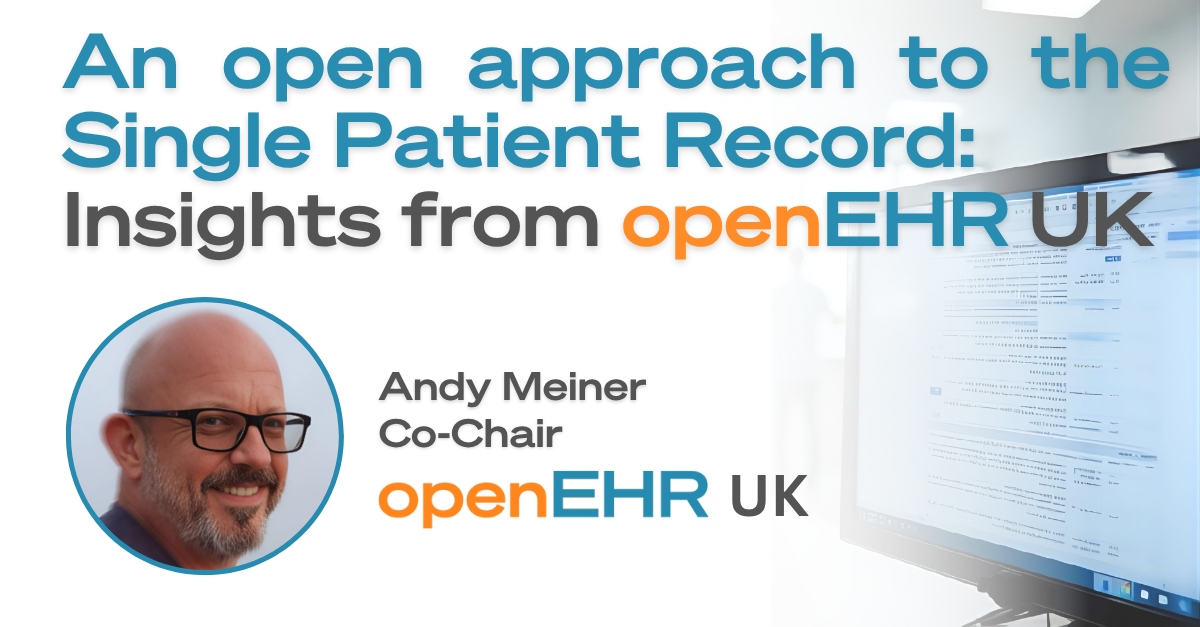by Andy Meiner, Co-Chair, openEHR UK.
As a co-chair of openEHR UK, I’m pleased to share insights from our recent formal response to the NHS England Single Patient Record (SPR) Request for Information (RFI). This initiative marks a significant step forward in healthcare interoperability and digital transformation in England, and openEHR UK is committed to playing a pivotal role in shaping its future.
Our response to the SPR RFI highlights openEHR’s proven capacity to enable robust, scalable, and semantically interoperable digital health solutions. Central to our submission is the recognition that a single patient record is more than just a technological challenge; it’s an opportunity to redefine healthcare delivery, clinical workflows, and patient engagement. openEHR’s architecture, built upon open, vendor-neutral standards, provides exactly the flexibility, modularity, and clinical agility required by the NHS.
We emphasised three key areas in our RFI response:
Firstly, clinical governance and data quality assurance remain paramount. openEHR provides a robust framework through clinical archetypes and templates developed collaboratively by clinicians and informaticians. This structured yet flexible approach ensures consistent data definitions, making patient information reliable, sharable, and actionable across care settings. One of the key takeaways from the recent HL7 and openEHR “Converge or Collide” event in Amsterdam was that openEHR archetypes provide a proven mechanism for enabling better engagement between clinical and technical stakeholders. This was identified as one of the reasons for some of the failures of the National Programme for IT. One outcome of the Amsterdam was the agreement that openEHR archetypes should be included in FHIR Implementation Guides to support better clinical engagement.
Secondly, interoperability and integration were core themes. Our response underscored openEHR’s strength in semantic interoperability, enabling different systems to meaningfully exchange and interpret data without costly and fragile interface engines. This interoperability not only reduces implementation time but also enhances the sustainability and scalability of NHS digital solutions. It was important in our response, to recognise the significant work that has been delivered by the Shared Care Record Programme, and our proposal seeks to build upon this and leverage the experience already gained around both the existing data feeds and business transformation already achieved. We actively encourage the use of HL7 FHIR to read/write into an openEHR CDR and suggest that the International Patient Summary would be a logical starting point for these types of mapping. This sentiment was echoed in the Amsterdam event, due to it being in global demand, by the creation of a workstream, comprising of HL7 and openEHR members, to define best practice around HL7 FHIR and openEHR using the IPS as context.
Thirdly, innovation enablement featured prominently in our submission. By leveraging openEHR’s vendor-neutral data repository, NHS organisations can easily integrate advanced analytics, AI-driven diagnostics, and patient-centred applications. This fosters an environment where innovation thrives without being restricted by legacy systems or proprietary formats. Our response suggested a ‘data mesh’ of federated openEHR clinical data repositories, but a single CDR, such as implemented in Catalonia and Greece, would be equally viable and it more an implementation issue.
openEHR UK also addressed the critical importance of engaging the clinical community. The success of any digital initiative hinges upon clinicians feeling ownership and trust in the technology. Our collaborative approach, deeply embedded within openEHR’s governance model, encourages continuous clinical input and feedback, creating solutions genuinely aligned with frontline healthcare needs.
We believe our approach aligns seamlessly with NHS England’s aspirations outlined in the SPR RFI. openEHR UK’s community is already working actively across multiple NHS Trusts, demonstrating tangible benefits including improved clinical decision-making, enhanced patient safety, and greater efficiency.
Looking ahead, we remain committed to supporting NHS England in this transformative journey. We see the Single Patient Record as an opportunity not only for technological advancement but for fundamentally enhancing patient outcomes and clinical efficiency across the UK. openEHR UK will continue to advocate for an open, collaborative approach to digital healthcare, ensuring that the NHS’s digital future is both sustainable and clinically relevant.
We warmly invite clinicians, informaticians, industry partners, and all stakeholders to engage with us as we work towards realising the potential of a truly interoperable NHS. Together, through open standards and open collaboration, we can deliver a healthcare future worthy of our collective ambitions.

Leave a Reply